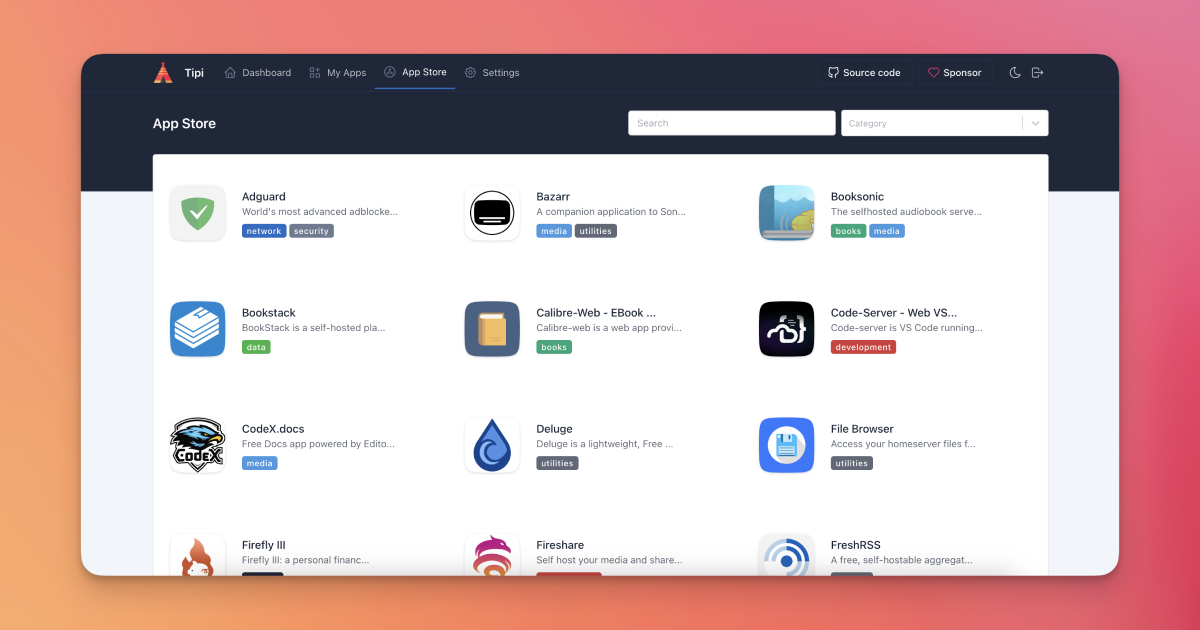- cross-posted to:
- [email protected]
- cross-posted to:
- [email protected]
It has an ‘App store’ that’s been growing a lot lately. Writing new docker-compose.yaml files is easy (see: https://www.runtipi.io/docs/contributing/adding-a-new-app ), and exposing them behind NAT, e.g. from home it’s easy too (see: https://www.runtipi.io/docs/guides/expose-apps-with-cloudflare-tunnels )… But my favorite perk is the folder structure (see: https://www.runtipi.io/docs/reference/folder-structure ), and the fact that ‘media’ is shared between apps.
Let me preface this with that I am an experienced CLI user and with Docker, so this really is not in my interest generally, but getting older and dealing with a variety of other personal issues, having a nice dashboard to deploy things sometimes is just really nice ya know? So I figured I would put on my dusty beginner’s hat to get this a run.
For the beginner, it’s a nice system to get started and get your feet wet with a no-nonsense app install experience. I tested this in a VM on my desktop and installed Sonarr and Sabnzbd which if you use Docker with these, you know the proper volume mapping is key. They take the hassle out of doing this for the end user. With that said though - file permissions are a bit off and both Sonarr and Sabnzbd needed the proper permissions set for the folders. Not a deal breaker for someone accustomed to the CLI, but for a new self hoster, this can be a bit frustrating.
Their app store is pretty impressive and I guess growing, the install on the server was painless to get running. It’s something to keep an eye on, it’s in good company with the other ones like Umbel and CasaOS, each has their own qualities.
For those wanting more fine grained control over the apps and installs, Tipi is a bit more opinionated to the port numbers and paths used and you can’t easily modify those (at least from what I could tell). In the long run, this is a non issue for the most part if you are starting on a freshly installed server and don’t want to handle the challenges of proper path mapping, reverse proxying and so forth. (They include Traefik in the install). Not having to worry if port 3000 is already taken or 8080 is, you can trust that it will handle it and it does!
I’ve been running Tipi for a couple months on a home machine. I don’t have any significant experience with Docker and Tipi was simple enough I could get it running pretty easily.
I use tailscale to access it away from home. I’m running FreshRSS, Invidious, LibReddit, Joplin and Vikunja. Pretty slick!
So I’m the kind of person who runs back ups using two synologies and is more of a GUI guy. I use mac and pcs very fluently but I’m not entirely terminal or command line literal.
Will something like this cause more problems if I’m looking to get rid of Google drive and start switching to next cloud or will this make my life easier?
This requires some command line to fully tame the beast(s)… sorry, the apps! that you’d be hosting. If you prefer an easy solution, for Nextcloud, specifically, I think you can try the managed instances (e.g. Hetzer offers ‘nx’ boxes). It’s better than paying premium fees to GAFAM imho every step counts ;)
How does this compare to Yunohost?
Does this allow you to run a reverse proxy or does this function like one itself since it already has certs? I don’t want to use Cloudflare Tunnels, which is what they list in their documentation.
I’d like to try this, but how will it work alongside my existing setup?
I run NPM to get SSL for my domain, so now there will be two services trying to do the same?
I also run Mattermost which is not in the Store here, so I will still need to run some things outside of this service - while still needing the SSL and reverse proxy.
Hum, the cloudflafe tunnel looks powerfull to bypass a CGNAT !
I haven’t had much luck with app-store-type solutions in the past, but this looks really promising! Thanks for sharing :)






